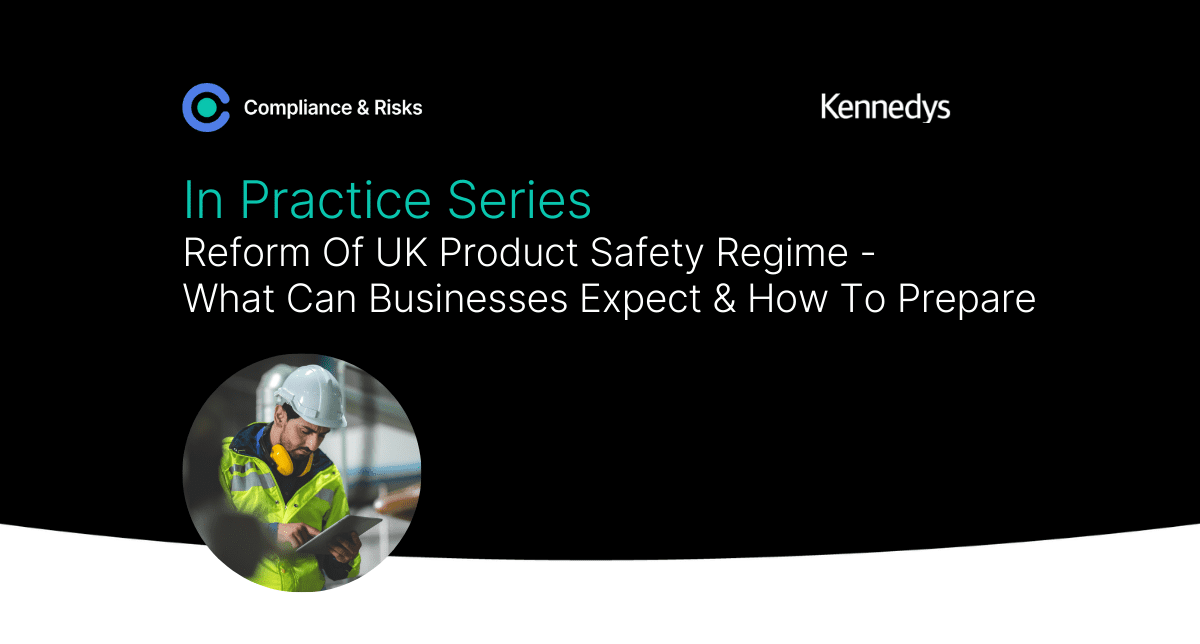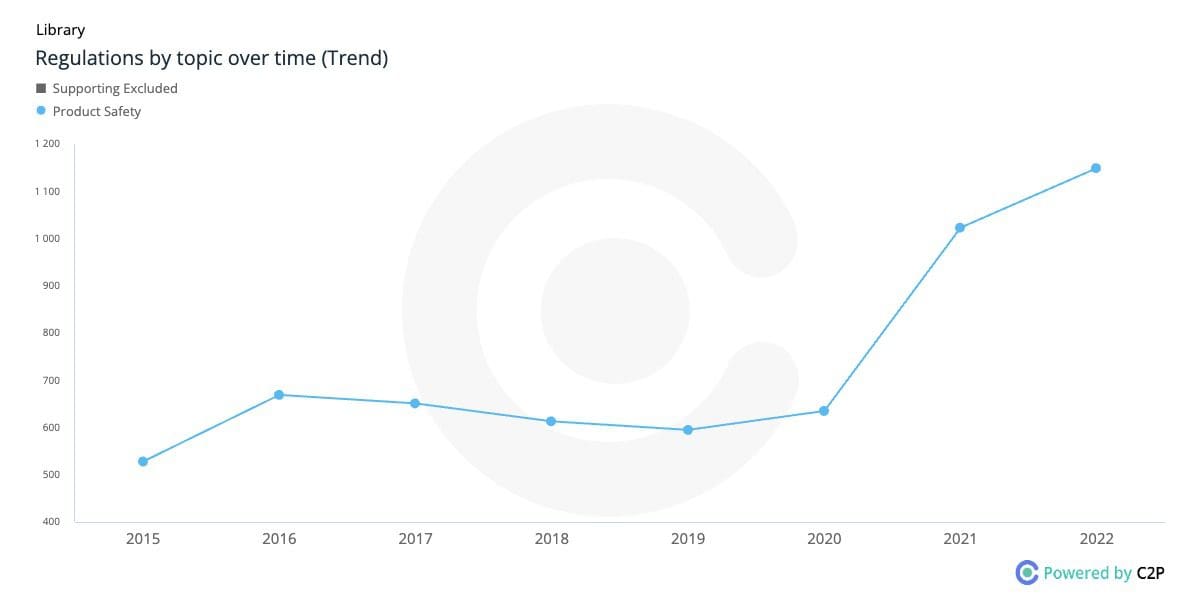
Reform Of UK Product Safety Regime – What Can Businesses Expect & How To Prepare

This blog was originally posted on October 17th, 2023. Further regulatory developments may have occurred after publication. To keep up-to-date with the latest compliance news, sign up to our newsletter.
OUR MONTHLY “IN PRACTICE SERIES” IS BROUGHT TO YOU IN PARTNERSHIP WITH KENNEDYS LAW LLP
TO HELP ENSURE YOU HAVE ACCESS TO PRACTICAL INSIGHTS BACKED BY OUR COMPREHENSIVE, IN-DEPTH REGULATORY EXPERTISE.
AUTHORED BY: SARAH-JANE DOBSON, PARTNER and Louise Forrest,
International Product Safety, Compliance and Liability Lawyer, KENNEDYS LAW LLP
UK Government Launched Consultation On UK Product Safety Regime
On 2 August 2023, the UK Government launched a consultation on the UK product safety regime to examine the fundamental tenets on which it is built with a view to reforming and future proofing the regime so as to make it fit for the 21st century. The time could not be more opportune given the drastic changes that have occurred in how we sell products and the changes in the products themselves. Furthermore, the UK has always regarded itself as a world leader in product safety and it is clear from the consultation that it seeks to maintain its foothold as such and not to be left behind in the shadows of the EU following Brexit.
The framework the UK is seeking to establish is one that fosters business innovation whilst simultaneously protecting consumers. In pursuit of this, it aims to revolutionise how it will use and share data with business and the public in a bid to support targeted enforcement and an agile evidence-based product safety framework. Ultimately, its goal, as laid out in the consultation, is to create a clearer, smarter, more proportionate regime while at the same time remaining responsive to consumer needs.
The Consultation closes on 24th October, and views from industry and affected stakeholders are actively encouraged before that date.
The Proposed Legal Framework
The consultation advances 13 proposals aimed at ensuring the UK’s product safety framework is future-proof and a global exemplar. The proposals can be grouped under three headings:
| Bringing Products To Market | Recognising the complexity of the existing product safety framework and consequent challenges to bring products to market, the aim of these proposals is to ease the burden on businesses. Proposal 1: Examine options for a new approach centred around potential hazard, cross-cutting risk-based safety requirements and transparency A hazard focused approach whereby products are categorised by their hazards and consequent risks thereby falling into one of several defined risk levels is proposed. This approach is said to lower the regulatory burden and compliance costs for lower risk products and unlock innovation while maintaining high levels of protection for the remainder of products. Categorisation criteria may include expected user group, likelihood of harm occurring and level of harm should it occur. Products which could cause death or serious injury would fall into the higher category. Proposal 2: Establish a derogation process, enabling businesses to apply for temporary regulatory easements to speed up supply of essential products in emergencies This proposal, prompted by the Covid pandemic, is to facilitate suppliers availing of an emergency derogation whereby essential products go through a streamlined regulatory process in times of national emergency thereby ensuring their availability whilst also maintaining safety standards. Proposal 3: Take full advantage of digital labelling Optional e-labelling is proposed in respect of certain marking and compliance labelling (UKCA conformity marking and manufacturers’ details), thereby removing the need to always apply physical labels. Benefits may include lower business costs, easily updatable information and less waste, but also noted is the need to ensure it does not curtail access to information by enforcement authorities or certain consumer groups. |
| Online Supply Chains | The consultation recognises the exponential growth in online sales and the many benefits it brings, but also new challenges to the product safety regime which pre-existed it. These include increased volume of non-compliant products, absence of a responsible economic operator in the UK making corrective action difficult, confusion as to where responsibilities lie, as well as a lack of product safety or seller information. Proposal 4: Clarify cooperation duties for new business models, particularly ‘online marketplaces’, to ensure effective cooperation This proposal seeks to define activities carried out by a business which would qualify them as an ‘online marketplace’ and thereby subject to certain duties. The duties, yet to be crystalised, are likely to include a duty to cooperate with enforcement authorities such as to provide information or take appropriate action if products are unsafe or non-compliant, and, possibly, to have a compliance function established in the UK. The latter is confusing given an earlier statement in the consultation that it did not consider a UK based economic operator the right approach. Proposal 5: Set out due care requirements in relation to unsafe product listings Proposed here is to set out specific due care requirements with regard to the identification and removal of unsafe product listings which online marketplaces will be required to meet. Examples include: collecting information about third-party sellers for high-risk products; monitoring for products which look very similar to products subject to recalls and taking appropriate action; gathering information about products and sellers and using this alongside information from enforcement authorities to provide more targeted monitoring and intervention. Proposal 6: For higher risk products, increase consumer-facing information on online product listings to support informed purchasing decisions This proposal addresses the anomaly whereby requirements to display certain product safety and traceability information are not replicated for online product listings. It also seeks to make it clear when a consumer is purchasing from a third-party seller. Information could include warnings, clear indication when the seller is a third-party, details of checks carried out on products or sellers, key product safety information which is already on product, packaging or accompanying documents. |
| Compliance & Enforcement | The following proposals strive to give confidence to businesses and consumers that those who break the law or cut corners to secure market advantage at the expense of safety will be stopped. Proposal 7: Enhance the leadership and coordination role of OPSS It proposes to expand the role of the OPSS as a leader and co-ordinator of product safety matters by providing it with the ability to produce statutory guidance for local authorities. It may also be given the power to take over an investigation from local authorities in instances which are nationally significant, novel or contentious. Proposal 8: Facilitate a rich source of data, by creating a new legal data gateway Under the proposal the OPSS would have the ability to request data to be shared across key operators in the product safety system thereby supporting the OPSS in identifying risks and trends, placing it in an optimum position to predict incidents and deploy timely interventions. Proposal 9: All notification of recalls and serious product safety incidents and other corrective action by a manufacturer or distributor is sent to OPSS, rather than the local authority, as soon as the economic operator has knowledge of an unsafe product This significant proposal seeks to introduce a requirement for recalls and all product related incidents of a certain level of seriousness to be reported to OPSS instead of local authorities. This will ease burden on local authorities, remove uncertainty for economic operators regarding reporting, provide a rich data source to OPSS and allow it to receive data more quickly thereby, being in a position to respond more promptly. Proposal 10: Consolidate and align our existing enforcement legislation This proposal seeks to address the spread of enforcement powers across an array of legislation from domestic, to EU retained to sector specific which has resulted in misalignment and inconsistency. It considers creating a single set of notices and offences covering all products in the framework. Proposal 11: Introduce improvement notices, civil monetary penalties, and enforcement undertakings This proposal envisages introducing new enforcement powers for authorities and increasing their use of the available enforcement powers such as improvements notices, civil monetary penalties and enforcement undertakings. Proposal 12: Explore options for changing inspection powers Facilitated by online marketplaces and accelerated by the pandemic there has been a rise in businesses operating from home creating challenges to inspection given the need for a warrant. This proposal intends to explore options in respect of existing inspection powers. Proposal 13: Reviewing the civil product liability regime in light of technological developments This proposal raises the possibility of revisiting the existing civil liability regime in light of technological development and product innovation. |
The Regulatory Trend
This graph shows the rise in product safety regulations in C2P, almost doubling since 2020. This is reflective of how jurisdictions like the UK are rethinking the current product safety landscape as we know it in light of technological and market developments.

The Consequences
The proposed changes heralded by the 13 proposals have the potential to considerably impact those who place products on the market as well as significantly alter the product safety terrain in the UK. Consequences may include:
- While the shift to a hazard-based approach sounds attractive in terms of overall easing the regulatory burden in the UK, manufacturers will conceivably be producing products for other markets, such as the EU, and therefore be required to deal with different systems which will likely increase complexity overall, as well as, costs.
- Increased obligations for online marketplaces, while welcome, may result in higher priced products which are ultimately borne by the consumer.
- While yet to be finalised, there is a possibility that a compliance function in the UK will be a requirement for online marketplaces.
- Although the consultation is underpinned by a desire to simplify the product safety framework and alleviate the regulatory burden it, nonetheless, contemplates mandatory reporting in certain instances, thereby increasing obligations on stakeholders in some circumstances.
- Given that the proposal envisages introducing new enforcement powers as well as increasing the use of existing powers, the consequences for non-compliance may be severe and have further reach than those under the current framework.
Checklist To Improve Compliance
The following points may provide some helpful guidance on how prepare for changes in the UK product safety system :
- Gain an overall understanding of the proposed legislative changes and how they may impact your business and products if they become law.
- Consider how a move to a hazard based system could impact the way in which you approach compliance and what steps you would need to take to make this transition and best prepare for it should it be put in place, particularly if you are selling into other markets.
- Review how your products are designed and evaluate whether there are ways in which you can ‘design out’ hazards and benefit from reduced regulatory obligations.
- If you are an online marketplace consider how you would develop systems and processes proportionate to your business and risk levels to assess and report on whether you are meeting your due care requirements should they come into force.
- Consider whether digitalising product labelling would be advantageous to your business in terms of costs and processes.
- Familiarise yourself with the increased enforcement powers should they be enacted so as to fully understand the implications of non-compliance to your business.
- If you are a business that operates from home consider what the extended inspection powers may mean for your business should they be put in place.
Stay Compliant With Global Regulations
Catch up with our previous editions of our In Practice Series –
- Get Ready For The Deforestation-Free Products Regulation
- How To Avoid “Greenwashing”
- How To Be An ESG-Conscious Product Manufacturer
- How To Get Ready For The New Product Liability Laws In Europe
- How To Prepare For The Upgraded Digital Services Laws In Europe
- The Future Medical Device Regulations Within The UK
- Sustainability Initiatives At EU Level – The Current Status
- Human And Fundamental Rights Violations In Supply Chains – What Can Responsible Businesses Do?
- Construction Products And Sustainability – What’s Expected?
- Ecodesign Requirements – What’s New?
- Get Ready for the Machinery Products Regulation
Stay Updated on Regulatory Changes
Join 30,000 global compliance professionals and get free webinars, whitepapers and regulatory blogs straight to your inbox every month








